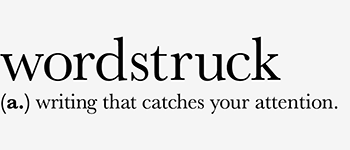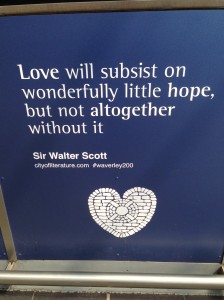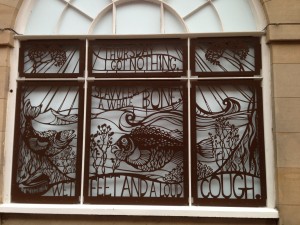I have travel on my mind at the moment. Unlike many, I’m not planning on jetting off on a summer holiday soon, but I am planning a few day trips, including time in Edinburgh.
In a couple of weeks’ time, I’ll be indulging myself at the Book Festival, and the Fringe. I have tickets for a few events and for the rest, will take the approach of turning up to see what I can get into.
I love spending time in Edinburgh. It’s far enough away to feel like an adventure, but not so far that I’m in danger of jet lag. There always feels like there’s lots to see, do and explore, no matter how many times I’ve visited. I generally walk my feet off getting from place to place.
I really enjoy the way the city wears its literature. It’s inescapable. From the Writer’s Museum to the Storytelling Centre; from the book festival to literary walking tours and pub crawls, you cannot avoid the fact that this is a Unesco City of Literature.
Many locations, street names and areas are familiar to me from reading. From Walter Scott to Alexander McCall Smith, Muriel Spark to JK Rowling, it’s been home and inspiration to many writers.
When I step off the train at Waverley, I half imagine I’ll meet some of their characters as I explore. I swear one day, I’ll see Rebus somewhere about town.
Even if you were unaware of its literary connections, words pour out onto the streets. You’ll find them etched on buildings, woven into window frames and hidden among the street furniture. It’s like a secret code that speaks to readers like me. It makes me smile as I encounter a poem that others pass by and never notice.
My last visit there introduced me to a beautiful poem, November Night by Scottish writer Norman MacCaig, that I discovered on the side of a planter. In the height of a Scottish summer, it reminded me of the realities of its winter.
Here is the first verse, which I craned my neck to read on the street:
“The night tinkles like ice in glasses.
Leaves are glued to the pavement with frost.
The brown air fumes at the shop windows,
Tries the doors, and sidles past.”
I wish more cities did this kind of thing. Poetry as part of the landscape is far more appealing than when it’s stuffed into study books. It’s unlikely that I’d have found this verse and its companions if I hadn’t chanced upon it. And I feel richer for it.
As I visit again this summer, I’ll be on the look out for more words on the street.



Comments are closed.